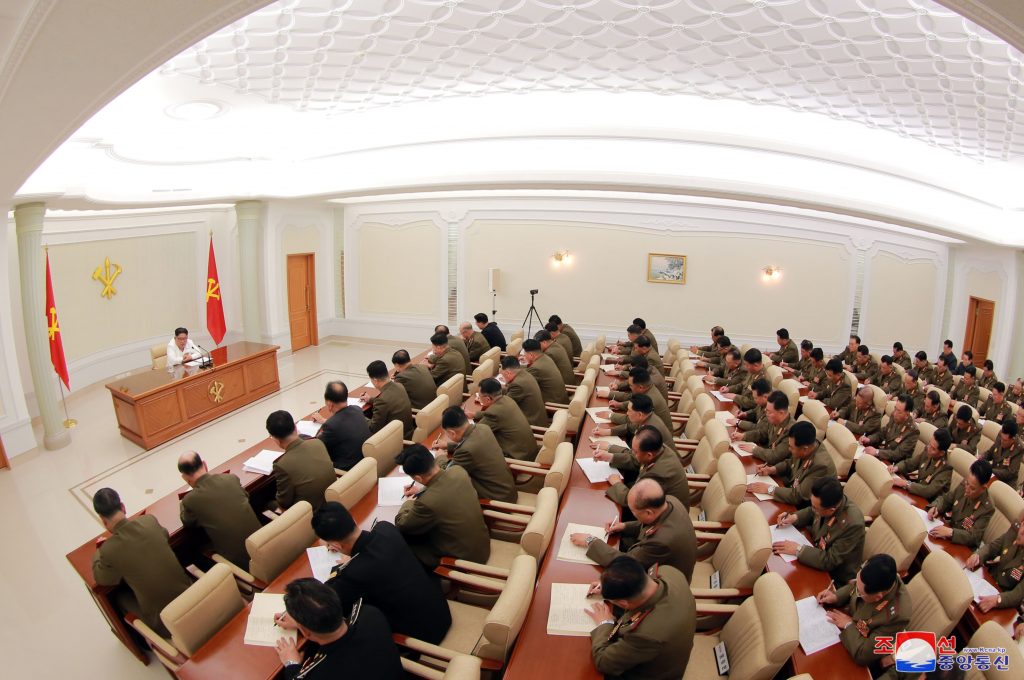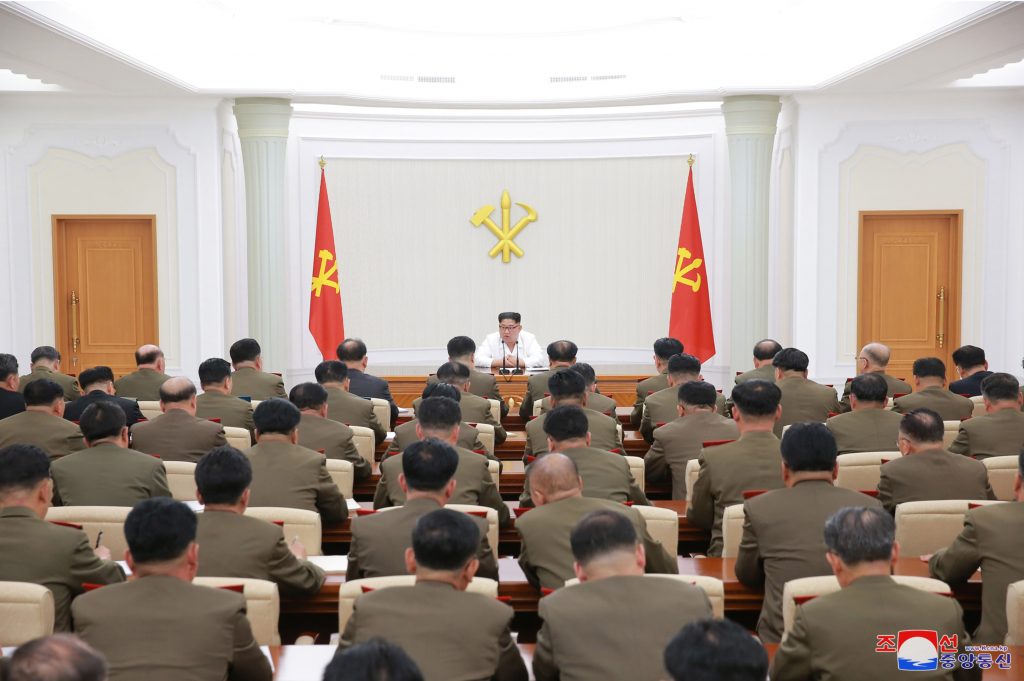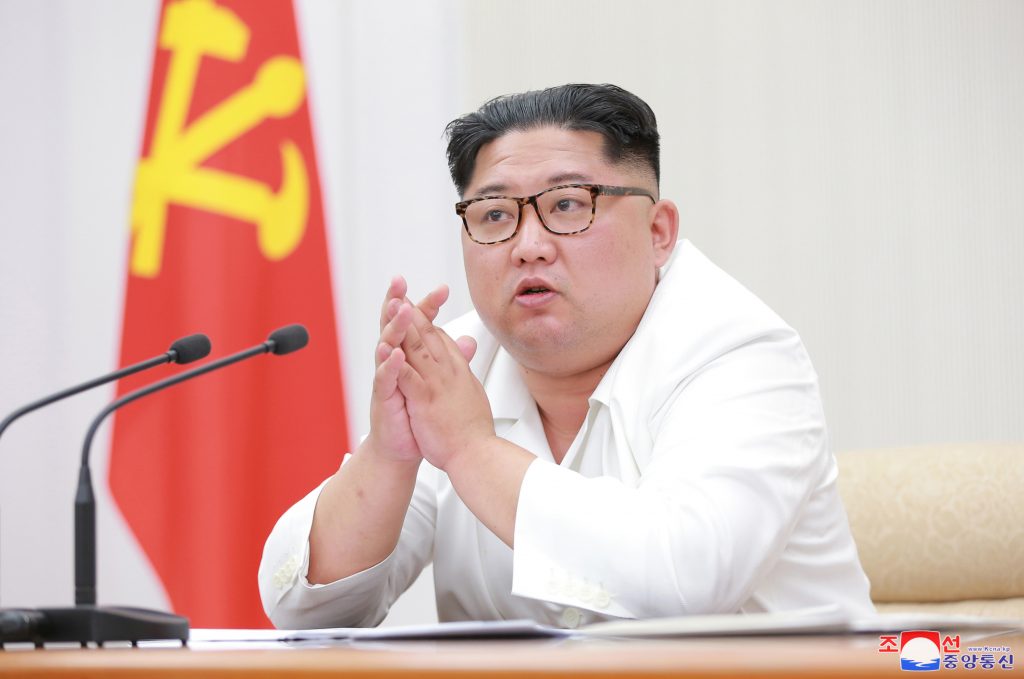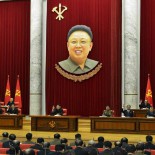Central Military Commission Meeting Held

Overview of an expanded meeting of the WPK Central Military Commission, held in Pyongyang on or around May 17, 2018 (Photo: Rodong Sinmun).
KJU’s last observed appearance was his meeting with US Secretary of State Michael Pompeo
DPRK state media reported on May 18 (Friday) that the Workers’ Party of Korea [WPK] Central Military Commission [CMC] held its first enlarged (expanded) meeting since the 7th Party Congress in May 2016. Kim Jong Un (Kim Cho’ng-u’n) chaired and guided the meeting.

A meeting of the WPK Central Military Commission, held in expanded session (Photo: KCNA/Rodong Sinmun).
Among those in attendance were: Chief of the KPA General Staff VMar Ri Myong Su (Ri Myo’ng-su), Minister of the People’s Armed Forces Gen. Pak Yong Sik (Pak Yo’ng-sik), Korean People’s Army [KPA] General Political Department Director VMar Kim Jong Gak (Kim Cho’ng-kak), 1st Vice Minister of the People’s Armed Forces and KPA General Logistical Department Director Gen. So Hong Chan (So Hong-ch’an), 1st Vice Chief of the KPA General Staff and Director of the KPA General Staff Operations Bureau Gen. Ri Yong Gil (Ri Yo’ng-kil), Minister of People’s Security Gen. Choe Pu Il (Ch’oe Pu-il), Minister of State Security Col. Gen. Jong Kyong Thae (Cho’ng Kyo’ng-t’aek), WPK Senior Deputy Director for Munitions Industry and head of the KPA Operations Command Group under the Personal Secretariat Ri Pyong Chol (Ri Pyo’ng-ch’o’l), WPK Organization Guidance Senior Deputy Director Kim Kyong Ok (Kim Kyo’ng-ok), Second Economy Commission [Second Economic Committee] Chairman No Kwang Chol (No Kwang-ch’o’l), Military Security Command Director Gen. Jo Kyong Chol (Cho Kyo’ng-ch’o’l), immediate past KPA General Political Department Director and WPK Organization Guidance Department Deputy Director Hwang Pyong So (Hwang Pyo’ng-so’), KPA Navy Commander VAdm Kim Myong Sik (Kim Myo’ng-sik), KPA Air and anti-Air Force Commander Gen. Kim Kwang Hyok (Kim Kwang-hyok), Vice Chief of the KPA General Staff and Artillery Commander Col. Gen. Pak Jong Chon (Pak Cho’ng-chon), Vice Minister of the People’s Armed Forces Col. Gen. Kim Hyong Ryong (Kim Hyong-yong), Vice Chief of the KPA General Staff Gen. O Kum Chol (O Kum-ch’o’l) and Vice Minister of the People’s Armed Forces Col. Gen. Yun Tong Hyon (Yun Tong-hyo’n). Also in attendance were CMC members, KPA corps commanders and various senior officials and staff of the KPA high command.
The last publicized and expanded gathering of the CMC took place in August 2015. The first expanded meeting of the 7th CMC “discussed and decided on a series of organizational measures to further strengthen the revolutionary army of the Party militarily and politically and improve the overall work for defending the country as required by the developing revolution and on the basis of the comprehensive analysis of the present actual state of the People’s Army.”

Kim Jong Un addresses the CMC (Photo: Rodong Sinmun/KCNA).
Kim Jong Un “analyzed and reviewed the implementation of the military and political tasks of the People’s Army after the Seventh WPK Congress and indicated the main orientation and ways of the army building and the military activities, including the issues of establishing more thoroughly the Party’s monolithic command system across the revolutionary armed forces, establishing the revolutionary military discipline, consistently holding fast to the Party’s policies of bringing about a radical improvement in military training, pressing ahead with the ideological revolution and putting the army on a modern basis and improving the military life.”
Jong Un stressed that “the whole army should firmly safeguard and reliably guarantee the all-people struggle for implementing the decisions of the 3rd Plenum of the 7th WPK Central Committee with the matchless bayonet.” He noted “with high appreciation” that the “People’s Army has fulfilled its duty as the vanguard and main force of the revolution on every major front of the socialist economic construction under the slogan ‘Let us take charge of both national defense and socialist construction.” He expressed his “expectation and belief that it would always maintain its revolutionary character and nature as the army of the Party and the leader and creditably discharge the sacred mission and duty it has assumed before the country and people, too.”
The CMC meeting also addressed and dealt with personnel matters. Some CMC members were recalled and replacement members appointed. The CMC also dismissed and transferred senior KPA officials, and appointed replacements.
Who’s (probably) off the CMC and who has been added: Reverting back to its practice of the George Carlin exercise of “let them figure it out,” DPRK state media did not disclose who recalled and who was elected to the CMC. Based on personnel appointments during the April 2018 plenary meeting (plenum) of the 7th WPK Central Committee and last month’s Supreme People’s Assembly [SPA], as well as changes KJU and the core leadership undertook during 2017, it is all but certain that VMar Kim Jong Gak was elected to the CMC as part of his appointment as KPA General Political Department [Bureau] Director earlier this year.
VMar Kim has been appointed to the other top positions, member of the State Affairs Commission and member of the WPK Political Bureau, that come with heading the KPA’s political commissar corps. In contrast to his predecessor as GPD Director, Hwang Pyong So, VMar Kim only has membership on the CMC, Political Bureau and State Affairs Commission. He was not appointed to Hwang’s SAC Vice Chairman’s slot or to the Political Bureau Presidium (standing committee). While the post of CMC Vice Chair (Jong Un’s first public senior leadership position) has been abolished, VMar Kim’s other personnel appointments, reflect the KPA General Political Department’s waning influence and function (which could be temporary) in DPRK political culture.
Another possible appointment to the CMC might have been WPK Munitions Industry Vice Chairman and Department Director Thae Jong Su (T’ae Cho’ng-su). If this happened, Thae replaced Ri Man Gon and has the MID’s seat on the CMC. However, Thae did not attend the CMC meeting (see below) and may have not been elected. The MID–which is responsible for the research and production of the North conventional weapons and WMDs–slot on the CMC may already have been filled by its senior deputy director Ri Pyong Chol or another member of the DPRK’s weapons industry, such as Second Economy Commission Chairman No Kwang Chol (who did attend the meeting) may have been elected. If No was elected, he would be the first CMC Member who was head of the 2nd Economic Committee since Kim Chol Man.
Here, Here, Absent: Three CMC members, WPK Vice Chairman and WPK Organization Guidance Department Director Choe Ryong Hae, DPRK Premier Pak Pong Ju and WPK Vice Chairman and United Front Department Director Kim Yong Chol (Kim Yo’ng-ch’o’l) did not attend the expanded CMC meeting last week. In fact, the few senior civilian leadership who did attend are either former senior KPA uniformed officers (i.e., Ri Pyong Chol, No Kwang Chol) or senior civilian officials who have spent their careers as political managers of the KPA and/or internal security services (i.e., Kim Kyong Ok, Hwang Pyong So). This was also the first expanded CMC meeting at which the current MID boss (Thae Jong Su) was not in attendance; it should be noted that Thae need not have been present in order to be elected to the CMC.
It is not clear if PPJ, CRH and KYC were removed as CMC members during the meeting (Choe was only elected, put back actually, on the CMC in October 2017). If they were recalled (removed) and the civilians who did attend last week’s expanded CMC meeting are any indication, it means that CMC is going to its late 1990s/2000s membership composition, in which only principal members of the KPA high command and a few security-focused civilians comprise the CMC’s formal membership. This would indicate that two years after the 7th Party Congress, Kim Jong Un continues to tweak the role and function of top power organizations.
Notably, in attendance, was former KPA General Political Department Director Hwang Pyong So. Hwang also attended the 3rd plenary meeting of the 7th WPK Central Committee in April, and has been present at several leadership events (including a couple of #1 Events). At the expanded CMC meeting, Hwang sat in the front row with other CMC members. There is a very good chance that Hwang has simply returned to his old position at the WPK Organization Guidance Department, having a portfolio involving the KPA, some internal security and the defense industries, and so retained his membership attended the CMC meeting in that capacity. If that is the case, it means that Hwang Pyong So was the DPRK elite who triggered OGD’s six-month investigation and inspection of the GPD (which resulted in Hwang’s ouster as its director). On the other hand, it would be neither unique nor unheard of for a senior DPRK official to be summoned to watch his own political execution (this happened to Jang Pyong Gyu at last year’s SPA session).
In a twist on musical chairs and meeting planning, the last known members of the CMC sat in the first and back rows of the meeting venue with members of the KPA high command and corps commanders sandwiched between them.
Senior KPA personnel appointments: The CMC also made several appointments to the KPA’s high command. As with the CMC’s membership status, these personnel shuffles were not disclosed by DPRK state media. ROK media speculated that Minister of the People’s Armed Forces Gen. Pak Yong Sik and Chief of the KPA General Staff VMar Ri Myong Su, who were at the CMC meeting as well as attended some sideline events during the high level inter-Korea summit, may migrated to other positions. If this is the case, it could take several days, if not a week or two, before these personnel changes are observed in state media reporting.
However, “senior officials of the armed forces organs” may not refer to the top-tier officials of the General Staff, Ministry of the People’s Armed Forces [MPAF] or KPA General Political Department. One of the outcomes of the GPD investigation of 2017 is that left a fairly sparse bench of top officials in that department; the heads of the Organization Bureau and the Propaganda Bureaus in GPD have not been observed in public in several months (and these are the types of DPRK elites that attend a lot of public events). The CMC also may have made some other second-tier personnel appointments on the MPAF and and General Staff that would normally be authorized by the GPD.
Whatever senior armed forces personnel matters have been transacted by the CMC, the immediate outcome is that Pyongyang has almost certainly changed some of the players and participants at both high-level leadership interactions (China, ROK, Japan) and working-level meetings, including inter-Korea military talks.
Circumstances of the CMC meeting: Kim Jong Un has not really spent a great deal of quality time, at least publicly, with the KPA. His last significant activity related to the armed forces was his attendance at the February 8 military parade. Jong Un’s last proper KPA field inspection was when he commanded and observed special operations forces [SOF] exercises in August 2017 and his last observed inspection of a conventional KPA unit was in June 2017. For innumerable and incalculable reasons, this willingly excludes all the fun and excitement of the ballistic missile drills of the KPA Strategic Force, (that’s a Party production, friends).
One thing to note is that the primary reason Jong Un gathered the CMC was so it would, however pro forma, authorize the closure and demolition of the underground test site at P’unggye-ri.
